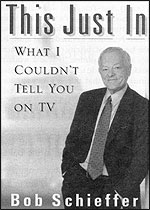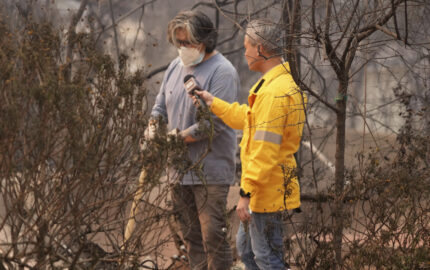
Medical Reporting
“The chasm between medical journalists and physicians appears mostly to be one of ignorance rather than conflicting interests or malice,” writes Terry L. Schraeder, who for 10 years worked as a medical journalist before entering medical school. Now doing her residency in internal medicine, she uses these experiences to highlight the problems between journalists and doctors and ways to close the widening gap of distrust. She is convinced that only when they “understand the other’s professional training, education, deadlines, responsibilities, codes of ethics, and internal stresses” will the chasm narrow. – Melissa Ludtke, Editor

This Just In: What I Couldn’t Tell You on TV
Bob Schieffer
Putnam Publishing Group. 448 Pages. $26.95.How many journalists can say that they covered the integration of Ole Miss, the John F. Kennedy assassination, Vietnam, Watergate, the Clinton impeachment, the election of 2000, and the events of September 11, 2001? Very few, no doubt. It’s even possible that there might be only one: Bob Schieffer.
Without fuss or frill, and with a reputation for getting the story, the versatile Schieffer has been at it for more than 40 years, in Texas as a radio reporter, newspaperman and television anchor and then at CBS as a correspondent, anchor, host of the “CBS Morning News” and, at present, moderator and commentator of the Sunday-morning institution “Face the Nation.”
It has been an impressive and enviable career, even if it has sometimes played out in the shadow of others, notably Dan Rather, Schieffer’s fellow Texan and stylistic opposite. Where Rather is intense, Schieffer is relaxed, but don’t mistake the calm demeanor for a lack of drive. One doesn’t get to hold the jobs Schieffer has, including the Washington correspondent’s grand slam (White House, Congressional, State Department, and Pentagon assignments) without being journalistically aggressive, to say nothing of being good at what you do. And one doesn’t come away from the jobs Schieffer has had without some keen insights into how the world works (or doesn’t) and without a cache of interesting and revealing tales. In this book, it is those tales and those insights that Schieffer blends into an engaging biographical narrative.
Schieffer writes that he has “always wanted to see things for myself and make my own judgments about them.” He recalls vividly one of the first big “things” he saw as a child in Forth Worth: Lyndon Baines Johnson, in the Senate campaign of 1948, swooping into town in a helicopter, making a stump speech and tossing his Stetson to the crowd. (Only years later did Schieffer learn that LBJ was aiming the hat at a campaign aide whose job it was to catch it and get it back to him before the next speech.) Johnson would go on to win—some say steal—the Senate seat by 87 disputed votes, earning him forever the moniker “Landslide Lyndon.” Schieffer would take something away from the campaign, too: the beginning of a life-long fascination with politics, on which he would eventually report at the highest levels.
Like many journalists before and since, Schieffer drifted through his college years—“I put little into it and got little in return.”—preferring covering wrecks and robberies for a local radio station to spending time in the pursuit of book knowledge. Journalism had a strong attraction for him. “I just liked being where the news was,” he writes, “knowing about it before other people did and telling them about it before other people could.” It would, of course, be hard to find a better description of why most journalists show up for work each day.
His First Big Story
If Schieffer ever thought journalism was something of a lark, that changed quickly when, as a 26 year old, he was dispatched by his radio station to cover his first national story: the integration, by federal court order, of the University of Mississippi. Schieffer, who concedes that he had never spent much time thinking about why whites and blacks lived apart, was surprised when he and other members of the media were not welcomed warmly by the good citizens of Oxford; indeed, the press, federal marshals, and anyone else who got in the way were attacked, even shot at, by mobs opposed to the admission to the university of a black man, James Meredith.
With the arrival on campus of thousands of federal troops, all-out war erupted, and Schieffer experienced for the first time the sheer terror that can go hand-in-hand with an assignment that has turned dangerous. When the shooting ended and the smoke cleared, two people were dead (one of them a reporter), hundreds were wounded or injured, and the Ole Miss campus resembled a burned-out battlefield. But Meredith was attending class. And a shaken Schieffer had learned some enduring lessons, not only about what it means to be a reporter, but also about race and hatred and the power of the federal government.
A Reporter’s Lucky Break
He learned another lesson—being lucky can sometimes be as important to a journalist as being skilled—on that dark day, November 22, 1963. Working the police beat for the Fort Worth (Texas) Star-Telegram, Schieffer was not among the paper’s reporters who were rushed to neighboring Dallas when President Kennedy was shot. In the bedlam of the city room, he picked up a ringing phone. It was a woman asking for a ride to Dallas. Doesn’t she understand that this is a newspaper, not a taxi service, and that the President has been shot? “I know,” she told Schieffer. “They think my son is the one who shot him.”
The woman on the phone was Lee Harvey Oswald’s mother, and she wanted to visit her son at the Dallas police station. Schieffer and a colleague picked her up and Schieffer spent the drive to Dallas interviewing her in the back seat. But he knew hundreds of reporters would be gathered at the police station. How could he hold onto the exclusive, even expand on it?
What happened next is one of the best-told stories of the book. Rather than spoil the reader’s enjoyment, let’s just say it involves a snap-brim hat and behavior by the author that an ethics class might debate for days.
President Kennedy’s murder took an emotional toll on Schieffer, much as it did on the nation at large. “We had come to believe our Presidents were somehow invincible,” he writes. “America lost its innocence that day in Dallas, and we would never look at government and politicians in the same way.” In the days following the assassination, Schieffer would become mentally exhausted, his feelings deadened. He writes that it would be a long time before he would get it behind him.
Something else, Schieffer believes, changed when Kennedy died: Television journalism replaced print as the country’s choice for news. In ways no one could have predicted, the nation had for the first time been brought together to share a national tragedy, and it was television that had done it. As Americans watched the remarkable events unfold on their screens, the country virtually stopped. “The scenes of that week,” writes Schieffer, “had been burned into the national psyche. No more would Americans have to see something written down in the newspaper to believe it.”
Reporting on the Vietnam War
It was a watershed moment, and he would not be immune to its consequences. In a few years he would trade in his pencil for a microphone, but first, he would go to Vietnam. There, the war was building and, with it, the American presence. Schieffer, always wanting to be in on the big story, somehow persuaded the Star-Telegram’s dubious editor to send him. The deal was this: Schieffer would let the wire services cover the big picture; he would stay behind the lines, report on Texas boys and not take any chances. Arriving in Saigon, Schieffer, his editor many thousands of miles away, did what all good reporters would do: He headed right for the action. “I wanted to know if I was a man,” he writes.
It wasn’t long before he would find out that he was indeed a man, even if, he admits, a “foolhardy” one. He dove into combat from land, sea and air, risking his life repeatedly to get stories and making sure that enough of them were about Texans to assuage his editor back home. Looking back, he reflects on why he did it: “I came to understand that war could be unparalleled adventure and, for lack of a better word, fun.”
He certainly understood that war is also deadly serious, and it has consequences. One of the most poignant moments in the book occurs when he tours a military hospital, and it hits him hard that the men there “would be going home, not as God made them, but as war has left them.” After four months, Schieffer, summoned by his editor, headed home himself, leaving Vietnam disillusioned with a war “where there are no front lines and the enemy always disappeared to fight another day,” and believing (wrongly, he regrets) that in a short time the Vietnamese government would fall and the Americans would be asked to leave.
When he got back to Forth Worth, Schieffer, whose stories from Vietnam had been heavily promoted by the Star-Telegram, was greeted as something of a celebrity. Before long, a local television station had snapped him up as an anchor. Not long after that and newly married, he set off to Washington with dreams of being a network correspondent. How he got to be one is a delightful tale, one of the finest in the book. So as not to give it away, all that will be said here is that Schieffer was as surprised as anyone to find himself suddenly intoning the words “Bob Schieffer, CBS News, Washington.”
The Washington, D.C. Beats
The CBS News that Schieffer joined was near the height of its excellence. Walter Cronkite was in the anchor chair in New York, and his program had just passed NBC’s “Huntley-Brinkley Report” in the evening news ratings. Schieffer was signing up with the best bureau in the television news business, the CBS bureau in Washington. Presided over by the demanding and autocratic Bill Small (“Mr. Small,” even to his correspondents), the bureau was the broadcast equivalent of the vaunted 1927 New York Yankees. Its Murderers’ Row included Roger Mudd, Marvin Kalb, Dan Rather and Daniel Schorr, backed up by a group of other seasoned correspondents. If this weren’t enough, the oracular Eric Severeid was in residence to put into perspective the news that the correspondents reported. The correspondents were highly competitive, not only with reporters from the other networks but also among themselves. In short, the atmosphere was proud and intense. When, on his first day, Schieffer asked where he would sit, he was told by Small, “You won’t, if you want to stay.”
But stay he did, working hard and well, moving from general assignment to a series of beats, getting some anchor work, staying out of controversy, letting his skills carry him up the ladder gradually. Almost 35 years later, he’s on a top rung, having had most of the television news jobs worth having. It’s been quite a run, and Schieffer provides some interesting observations on the jobs he’s held.
He very much enjoyed working at the Pentagon and calls it “the best of all beats to learn how Washington works,” a good place to develop sources. Reporting from the State Department was far less satisfying: “I could never seem to get a straight answer from anyone.” The White House, despite the reputed glamour of working there, also proved in some ways to be a disappointment. Schieffer recalls it as a “place where real reporting was all but impossible and where you had contact with the President and his staff only when they chose to see you.” It is covering Congress, where he still spends time each week, which he considers truly interesting, even fun. Schieffer likes the access provided by what he calls “the greatest concentration of characters ever assembled under one roof.” He says that Congress is the last place in Washington where reporters can be in daily direct contact with newsmakers.
Schieffer decries the growing partisanship in politics and the trend in presidential campaigns for images to be emphasized over issues. But he seems to be an optimist by nature. True to this, he takes heart in the way Washington and the nation dealt with the tragedy of September 11th. “We had been through one of the worst days in American history,” he writes, “but it brought out our best.” At the end of that long and difficult day, he recalls, several hundred members of Congress gathered on the Capitol steps, and it wasn’t long before the strains of “God Bless America” were heard. Democrats and Republicans had come together. Hope and resolve were replacing fear. And Bob Schieffer was just where he wanted to be: right there to report on it.
Bill Wheatley, a 1977 Nieman Fellow, is vice president of news at NBC. He was the executive in charge of that network’s coverage of the Iraq War.


